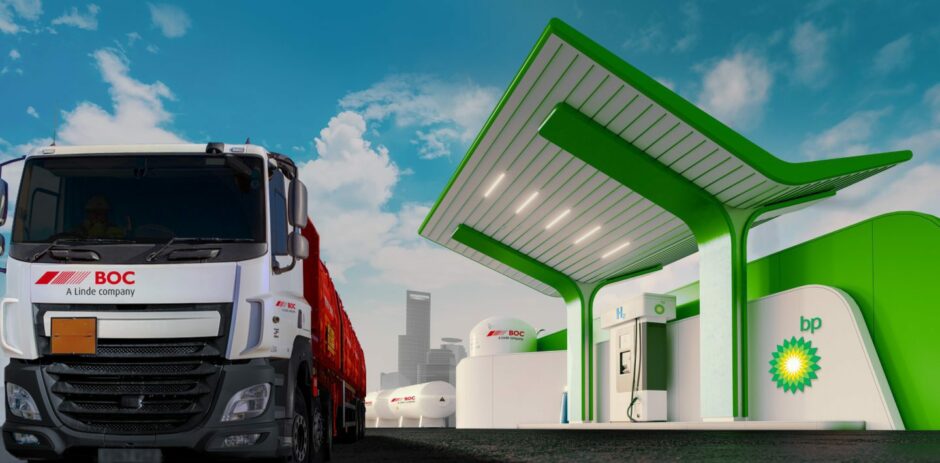
BP has submitted a bid for its proposed flagship large-scale green hydrogen production facility, HyGreen Teesside.
The bid was submitted to the UK government’s Hydrogen Business Model (HBM) and Net Zero Hydrogen Fund (NZHF), which both aim to encourage the growth of the low carbon hydrogen economy across the UK, supporting commercial development.
The production site is set to be one of the biggest green hydrogen facilities in the UK, targeting production by 2025 with an initial planned phase of 80MWe (megawatt electric) of installed hydrogen production capacity.
BP aims to deliver up to 5% of the UK’s hydrogen target of 10GW by 2030, following the site’s planned expansion of up to 500MWe.
With a capacity to provide enough low carbon hydrogen to power the equivalent of over 10,000 heavy goods vehicles, BP claims the site will “help fuel the development of Teesside into the UK’s first major hydrogen transport hub.”
In addition to HyGreen Teesside, BP also plans to develop H2Teesside, one of the UK’s largest blue hydrogen production facilities recently shortlisted for UK Government support as part of the BEIS CCUS cluster sequencing Phase-2 process.
Combined, these two projects have the potential to 15% of the UK government’s 2030 goal.
Local interest
Alongside the Hygreen project, BP is investing in the Teesside area by providing funding for the new Clean Energy Education Hub at the Redcar and Cleveland College, which will help deliver green skill development opportunities for the community.
The firm also confirmed four new Memorandums of Understanding (MoUs) for use of the green hydrogen in local businesses and communities.
These MoUs include offtake deals with; Northern Gas Networks for its Hydrogen Village in Redcar, Ensus for its renewable ethanol production plants, Tees Valley Lithium for its processing facilities and Sembcorp Energy UK for some of its assets at Wilton International on Teesside.
Senior hydrogen strategy manager at NGN, Mark Danter, said: “We’re delighted to work with bp on our proposal to switch the gas supply in parts of Redcar to hydrogen from 2025. Locally produced green hydrogen is vital to our plan and will make parts of Redcar self-sufficient, whilst creating jobs and investment in the area”
Earlier in the year BP also signed a MoU with Abu Dhabi renewable energy company Masdar to collaborate on the HyGreen Teesside project.
UK head of country and senior vice president of Europe at BP, Louise Kingham, said: “We aim to produce green hydrogen that can help decarbonise industries, heavy transport and even provide heat in homes. And we think HyGreen Teesside has the potential to transform energy use, the economy and skills in the local region.
“The strong support we’re already seeing from customers reflects the need for us to deliver this for both Teesside and the wider UK.
“We’re not stopping there – our plans for mobility will also help drive the UK’s position in pioneering hydrogen and battery electric technology in transportation.
“Together, these can help deliver economic growth for the region and the home-grown hydrogen that the UK needs.”
Additional efforts in hydrogen
The UK energy giant is also leading an international group of companies, freight operators, OEMs and an academic institution in bidding for support from Innovate UK as part of the Zero Emission Road Freight Demonstration (ZERFD) programme.
Aiming to establish a network of hydrogen refuelling and electric charging hubs, alongside a supply chain based around Teesside, the consortium will support the servicing of a core fleet of battery electric and hydrogen fuel cell trucks supplied by HyGreen Teesside to help decarbonise heavy transport in the region.
Recommended for you

